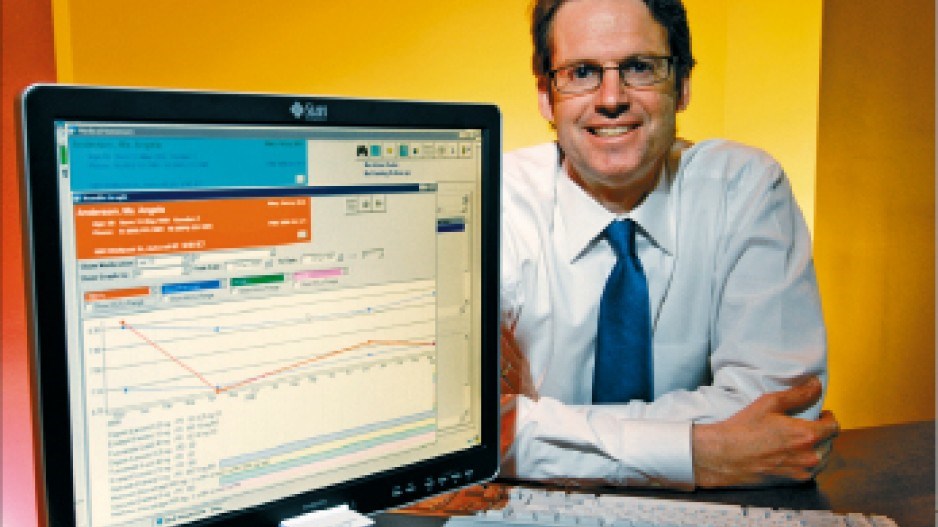By 2020, thanks to an aging but longer-living population, provincial governments are on track to spend 50% of their budgets on health care, according to some estimates.
Already, B.C. spends about 42% of its budget on that necessity.
But despite B.C.’s $17.6 billion health-care budget, emergency room physicians here still can’t access some information on patients, such as when they had their last vaccination, what prescription drugs they might be on and what other medical conditions they might have.
“We spend a ton of money gathering information – we don’t do anything with that information,” said Brendan Byrne, the physician behind Wolf Medical Systems, which developed the electronic medical record system (EMR) purchased recently by Telus (TSX:V). “It’s paper charts in doctors’ offices with illegible handwriting. As other industries have evolved, and technology has transformed them, health care has remained way at the back of the pack.”
Telus is hoping to change that. It’s pushing for Canada-wide adoption of e-health initiatives that it says will save money and lives.
“The private sector has the technology, innovation and talent to crack the code on health-care affordability,” Telus CEO Darren Entwistle said in November in an acceptance speech when he received the Fraser Institute’s T. Patrick Boyle Founder’s Award.
“If we fail to meet this challenge, Canadians will undoubtedly see the erosion of other public services and less private-sector investment, as health care consumes our resources at a ferocious pace.”
Telus is best known as a telephone, Internet and wireless company. But it is also an e-health company, having invested $1 billion in health-related initiatives over the past five years, starting with the acquisition in 2007 of Quebec-based Emergis, which developed programs for health and financial services.
More recently, the company’s health unit – Telus Health Solutions – bought Wolf Medical Systems for an undisclosed amount.
Wolf’s EMR system is already used by 1,500 doctors in B.C. and Alberta, which is one of the reasons Telus bought it – for its market share. Because the system is web-based, it can be hosted in the Telus cloud, allowing for easier and secure integration with other Telus services.
“Because it’s SaaS-based, it allows us to layer on other services,” said Paul Lepage, senior vice-president for Telus Health Solutions.
Privacy has long been a big concern with respect to sharing medical information. Telus has the ability to manage the information securely.
“The ability to connect doctors to pharmacists to patients to insurers and providers, no one else has that capability, and Telus is uniquely positioned to deliver on that,” said Byrne, who is now vice-president of Telus Physician Solution.
One of Telus’ other services is Assyst RX, a pharmacy-management system used by more than 3,000 drugstores. Another is Health Space, a personal health portal that allows patients to manage their own health information.
Many doctors’ offices still use hard-copy files of patient medical records stored in colour-coded envelopes. EMRs replace that system with a web-based patient-information system.
The system handles scheduling and will allow physicians to send prescriptions directly to pharmacists, which may address a problem identified in a study published in the Canadian Medical Journal that concluded prescription errors contribute to 10,000 deaths annually.
“Up to 40% of handwritten prescriptions are filled out with errors,” Lepage said.
Telus plans to integrate the EMRs used by doctors with Health Space portals – which is powered by Microsoft’s HealthVault – so patients’ medical information will be made available to the patients themselves.
New parents will be able to use it to keep a personal health record for their babies, for example, and physicians who are using the Telus EMR will be able to transfer patient information to the child of an elderly parent so he or she can then keep track of things like doctor’s appointments and prescriptions.
Another e-health initiative is Upopolis, a secure, private social networking site hosted by Telus that allows kids with cancer to stay connected with friends, family and classmates back home while they are in hospital receiving cancer treatment. The site also allows them to learn more about their disease, create blogs, do instant messaging and even stay on top of homework.
Telus hopes as more doctors and patients go digital with their health information, health institutions, like hospitals, will follow.
“The idea,” said Lepage, “[is that] connecting care and moving information across that continuum will break down those silos that you experience in emergency.” •




